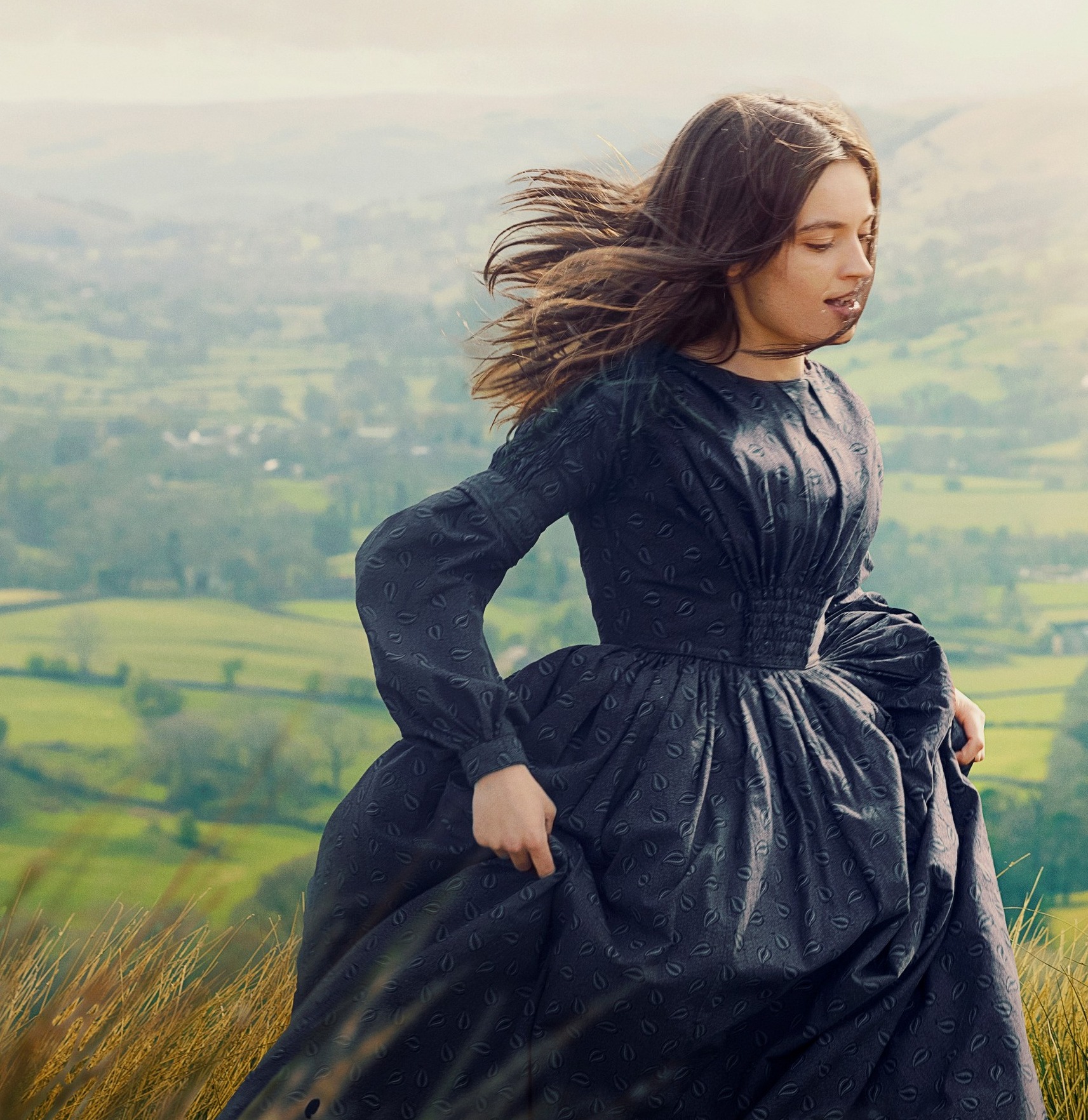
Film Critic Milly Haire praises Emily, finding it a powerful and thrilling imagining of the life of Emily Brontë
Emma Mackey is breathtaking as the protagonist in this darkly thrilling new reimagining of author Emily Brontë’s life. A tale of love and loss and longing, director Frances O’Connor has made a truly sensational debut, drawing strongly on the gothic elements of Brontë’s only novel Wuthering Heights with its bleak and haunting cinematography. The film was shot on location at the parsonage where the sisters grew up in Haworth, Yorkshire, and the focus on the surrounding nature is a key element of the film, with the repeated visuals of the moors and trees throughout almost becoming a background character. It is easy to see why the Brontë siblings were so artistically inspired.
Mackey is truly sensational in the role, taking us as the audience on an immersive journey through Emily’s struggles
Whilst several aspects of the film are not accurate to Emily’s real life (as very little is known about it), O’Connor has never claimed that it is a truthful biopic, but rather a dramatic and romantic imagining of what may have inspired her to write such a tumultuous piece of literature as Wuthering Heights. It is at once chilling, heartbreaking, entertaining and solemn.
Emily (Emma Mackey) is, in contrast to her sisters Anne (Amelia Gething) and Charlotte (Alexandra Dowling), rather a wildcard; she is a rulebreaker, fiercely opposed to new people outside of her closely knit family circle, passionate and daring and full of fire that she refuses to extinguish in order to follow in her sisters’ footsteps. She doesn’t fit in in her local village, and is frequently warned against ‘bringing shame’ on her family by her father and sisters. Mackey is truly sensational in the role, taking us as the audience on an immersive journey through Emily’s struggles.
Conversely, she has a fiercely loving relationship with her brother Branwell (Fionn Whitehead), and the two of them portray a dynamic (and dangerous) duo. Scenes of them running together across the moors, of the sisters and their friends drenched in a surprise thunderstorm, and of Emily and her lover in a barn, are all reminiscent of classical period dramas – think Pride and Prejudice (2005) – albeit rather more debauched, tackling themes of addiction, bereavement and gender inequality in a way that centres the film, set in the 1800s, firmly in the present moment.
The loss of the siblings’ mother is a pertinent undercurrent throughout, and we see each of the sisters grapple with their grief in very different ways. The visuals are accompanied by a sweeping and evocative instrumental soundtrack, composed by Abel Korzeniowski, with swelling orchestral crescendos that drive the more heightened scenes to an almost feverish pitch.

The relationship between Emily and new curate William Weightman (Oliver Jackson-Cohen) is incredibly Heathcliff-and-Cathy-esque, and takes centre stage at various points throughout the film: while Emily is at first reluctant to acknowledge the newcomer, they quickly begin an illicit relationship, a formative element of Emily’s characterisation. The storyline is fast-paced and intense, interspersed with the additional complications of Branwell’s situation and Emily’s own turbulent mental state.
But it is not all doom and damnation; there are moments of lightness, of tenderness and joy. Jackson-Cohen perfectly fulfils the role of brooding love interest; he is infuriating, inconsistent and charming. O’Connor does a brilliant job at centralising Emily at all times, and at no point does it feel like the more problematic aspects of the protagonist’s life are being romanticised unnecessarily; Emily’s tendency to daydream and exist in her own fictionalised world is always framed by an astounding awareness that it is not always reality, with the other characters providing more harsh and pragmatic external perspectives through their dialogue.
It is certainly a contemporary vision, firmly positioning itself at the forefront of recent 21st century cinema
The relationship between the sisters, particularly Emily and Charlotte, is tumultuous and changeable – much like Emily’s moods, mirrored by the mercurial weather. Emily’s costumes are dark and comparatively plain next to the less severe, and more frivolous, bonnets and dresses of Charlotte and Anne.
Emily, whilst historically accurate in aspects of the costumes and set, does not adhere to the strict and traditional language of more classical period pieces; it is certainly a contemporary vision, firmly positioning itself at the forefront of recent 21st century cinema. The combination of the storytelling and myth that the sisters grew up shrouded in, intermingled with Emily’s own wild imagination – expertly represented through the constant presence of the unnameable and unpredictable moorland – makes for an electrifying visual journey.
Verdict:
Emily is a powerful piece of cinema, albeit with a rather abrupt ending – although the opening shot arguably rescues this by establishing a final destination for the narrative from the very beginning of the film. Perfect for the bleak autumnal months as we head into winter, O’Connor’s first film as a director is a triumph, and Emma Mackey deserves critical acclaim for her spellbinding performance.
Rating: 9/10
Emily is out now in cinemas
For more recent releases, have a read of these articles from Redbrick Film:
Comments